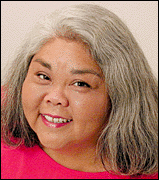


![]()
Under the Sun
Humans tend to think
Earth is our playgroundIn a plastic pot in a battered greenhouse in the Waianae mountains lives the silene perlamanii. If it had a common name once, no one knows it. If it had a Hawaiian name, it has been lost. It is extinct in the wild.
It's not a showy plant. With small leaves and tiny white flowers, I doubt it was used to make lei or other ornamentation. Whether it had medicinal or other human-related purposes, no one knows. There are no Hawaiian lore or legends about it. Its value is that it just is and that it once occupied a place in the soil of the Hawaiian islands. For the folks at the state's Pahole Natural Area Reserve, that's enough reason to save the silene perlamanii and that's the way it should be.
Humans have this tendency to look at what surrounds us and ask, "What have you done for me lately?" Our perception that we are the dominant species often leads us to think that the world is there to serve our needs. So we weigh the importance of saving rain forests with the reasoning that one of the plants that thrive in them may someday be revealed as a cure for cancer or heart disease. Under those circumstances, we decide rain forests are worth saving -- until we decide we want them for something else.
This way of thinking carries through as politicians in Washington have been considering drilling for oil in the Arctic National Wildlife Refuge. The refuge is one of the last places in North America that can truly be called wilderness. It is among the least affected by humans, the most complete and undisturbed ecosystems on the planet. The land was designated as a refuge because of this. Now its value is the oil that lies beneath its permafrost.
For the Bush administration, it seems that drilling the refuge speaks for its petulant desire to have its own way. President Bush's friends in the oil industry aren't wild about extracting oil there. It would cost too much and, although industry groups claim the amount of oil waiting to bubble up is significant, they are guessing, just as environmentalists, who say there isn't enough there to keep cars running beyond a few months, are guessing , too.
For reigning Democrats in the U.S. Senate, stopping efforts to drill in the refuge is less about being guardians of the environment and more about blocking Bush. It's about making big muscle as mid-year elections draw nearer. Hawaii's two Dans in the Senate, Akaka and Inouye, voted against their party, both contending that they were supporting the rights of indigenous people to self-determination. Sounds good, but, truth be told, not all indigenous people favor oil exploration, only the ones whose treaty prevents them from drilling on their own land unless the refuge's coastal plain is opened first.
A few months back, I caught part of a radio show, one of those where the person who yells loudest wins the argument. A man was braying about tree-hugging, spotted-owl-loving environmentalists who in their zeal to save furry creatures were interfering with the natural evolutionary process.
His contention was that humans are supposed to tame nature and use its products for our own benefit. Otherwise, we'd still be living in caves and starting fires by rubbing sticks together. If in the process of human development, plants and animals died off, that was Mother Nature's method of selection -- survival of the fittest.
He had a point. If humans hadn't discovered fire and the wheel, and made tools and learned to cultivate food, if there had been no industrial revolution, we might still be huddled in darkness. But if we are reshaping the world for our use, we should also minimize the adverse effects we have on it.
We've stepped away from our connection with our natural surroundings. We forget we are just one element in the universe and a small one at that. We don't have to see the refuge, walk across it, ride its waterways or use it for anything. The vast wilderness of the refuge is valuable for what it is.
Feeling our smallness is important. We're like that plant with no common name. We're becoming an endangered species. We are already extinct in the wild.
Cynthia Oi has been on the staff of the Star-Bulletin for 25 years.
She can be reached at: coi@starbulletin.com.